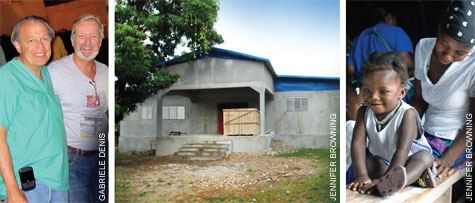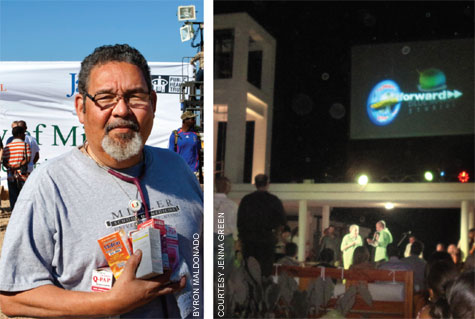 |
 |
Fostering a Healthy Future
By Dwayne Campbell
New techniques in magnetic resonance
and other imaging technologies being pioneered by Miller School faculty are paving the way for more accurate evaluation of several complex conditions.
 |
| From left: Project Medishare founders Barth Green, M.D., and Arthur Fournier, M.D. Project Medishare’s Akamil facility is ready to open in the Central Plateau, where it will help improve nutrition for Haitian youngsters like this little girl. |
Just before Christmas, Port-au-Prince’s young business elite gathered at the venerable Hotel Montana to raise money for a critical care hospital, trauma network, and medical education center for Haiti.
High above the bustle of the Haitian capital, the young guests mingled in the hotel’s terraced gardens as Barth Green, M.D., professor of neurological surgery and co-founder of Project Medishare, shared his vision for a world-class critical care trauma hospital and rehabilitation center.
Modeled after the University of Miami/Jackson Memorial Medical Center’s Ryder Trauma Center, it would be the hub for a network of 15 level-two trauma centers across the nation’s ten districts and include a training center for Haiti’s health care professionals. Critical care would no longer be available only to patients who could afford a plane ticket elsewhere.
When the January 12 earthquake struck three weeks later, leaving the Montana in ruins and hundreds of guests missing, the need for a national trauma system grew all the more urgent and gained much-needed momentum. With Haiti on the world radar and former President Bill Clinton serving as United Nations special envoy to the hemisphere’s most impoverished nation, other countries, non-governmental organizations, and business interests are making commitments and forging partnerships to carry out the plan Green has nurtured for years.
 |
| Long-time Medishare volunteer Michel Dodard, M.D., carrying supplies. Under the lights, Dr. Green shares his vision for a trauma network at the Hotel Montana, just weeks before its collapse. |
“Barth had a vision and took a ‘lead, follow, or get out of the way’ approach,” says Project Medishare co-founder Arthur Fournier, M.D., professor of family medicine and associate dean for community health. “He’s been a tireless advocate for the Haitian people—a hero who leads by example.”
At the time of the disaster, Green and Fournier, who founded Project Medishare 16 years earlier to improve the health care infrastructure of a country where too many people still die in childbirth, from malnutrition, or drinking dirty water, had hoped to be celebrating. Two Medishare projects in the Central Plateau, a maternal health center and a facility to produce Akamil, an affordable nutritional supplement, were nearing completion and a dedication ceremony was in the works.
Instead, Project Medishare, in partnership with the UM Global Institute for Community Health and Development, operated the only critical care hospital in Haiti with a volunteer staff in four tents at the edge of the Port-au-Prince airport. Established by the Miller School nine days after the quake, the hospital, which has moved to more permanent quarters until the trauma network becomes reality, also has assumed the role of a rehabilitation and recovery center.
Now survivors who lost limbs or suffered brain or spinal cord injuries are receiving rehabilitative care previously unavailable in the Caribbean nation. And, slowly but surely, the volunteer staff, mostly from North America, is being replaced by Haitian physicians, nurses, and other professionals eager to fill a huge void.
“The earthquake has created a niche that can be filled,’’ Fournier says. “We saved more than 100 spinal cord-injured patients; now they need to be rehabilitated. There are many people with signs of post-traumatic stress syndrome; they need psychologists.’’
Building sustainable programs by nurturing local talent is a Project Medishare hallmark. Led by dedicated faculty like Green; Fournier; Michel Dodard, M.D., associate professor of family medicine; André Vulcain, M.D., assistant professor of family medicine; Seth Thaller, M.D., professor of surgery; and Vincent DeGennaro Sr., voluntary assistant professor of surgery, physicians, residents, and students have for years worked with Haitian counterparts to fix cleft palates, perform neurological, orthopaedic, and obstetric/gynecological procedures, deliver primary health care, distribute water purifiers, and screen for diseases like sickle cell anemia.
With a five-year grant from The Green Family Foundation, the Department of Pediatrics and Medishare significantly improved the lives of the more than 85,000 people who were living in the Central Plateau’s Thomonde before the quake. Between 2003 and 2006, local doctors, nurses, and others trained by the Initiative in Pediatric Infectious Disease, Immunology and International Health conducted more than 28,000 home visits, increased immunization rates from less than 10 percent to 86 percent, instituted prenatal medical checkups for pregnant women, and treated thousands of children for worms or infantile diarrhea.
The remarkable result: Mortality in Thomonde plunged by more than 30 percent.
But an influx of earthquake survivors has spiked Thomonde’s population by 29 percent, deepening the desperation and poverty in Haiti’s poorest region and making Project Medishare’s mission more vital than ever.
For now, the maternal health center in nearby Marmont, funded by the parents of Miller School graduate and Medishare volunteer Elizabeth Greig, is the temporary home of a health clinic damaged by the temblor. But once the clinic is repaired and the maternal center is able to acquire the proper equipment, it will provide round-the-clock services to pregnant women who too often die in childbirth.
If the start-up costs are met, Project Medishare still hopes to open the plant to process and package Akamil by late fall. If so, the fortified blend of cereals and beans crushed into a powder won’t just nourish stunted children; the supplement will be a cornerstone of economic development, enlisting subsistence farmers to grow the raw materials and other locals to prepare and market the product for sale. The construction phase alone created 175 jobs.
And that was by design, not coincidence, for Project Medishare knows that the modern health care the Haitian people deserve will not come without improvements in the economic and social factors that perpetuate poverty.
As Dodard notes, “The core Project Medishare mission is teaching and training, but the goal is for us to be out of a job one day.’’
|
 |
 |


